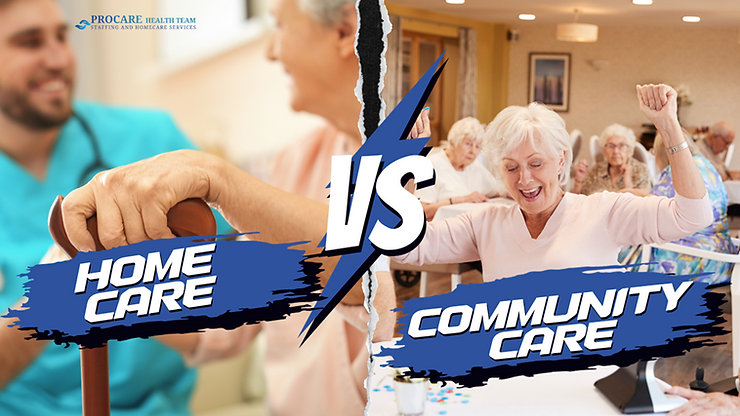Choosing between home care and community care can be a difficult decision for individuals and families considering long-term support options. Both forms of care are designed to assist those in need, but they each offer distinct benefits and limitations. The purpose of this blog post is to explore these options in greater detail, providing a comprehensive guide to understanding home care and community care. We will delve into the various aspects of each to assist you in making an informed decision that suits your needs or those of your loved one.
Understanding Home Care
Home care refers to a range of services provided in a person’s home to help them with personal care and daily activities. This type of care is often suitable for individuals who wish to remain in their own homes and maintain a sense of independence yet require assistance with certain tasks.
Personal Care and Companionship
In the realm of home care, personal care encompasses assistance with activities of daily living such as bathing, dressing, and grooming. Companionship services are also a critical component, ensuring that the individual has social interaction and is engaged within their own home, which can prevent feelings of loneliness and isolation.
Skilled Nursing and Therapies
For those with medical needs, home care can also include skilled nursing services. Nurses can manage medications, provide wound care, and monitor the health status of the individual. Additionally, home care can offer therapies such as physical, occupational, and speech therapy.
Pros and Cons of Home Care
One of the primary advantages of home care is the personalized attention that is provided in the familiar surroundings of one’s own home. This often leads to improved comfort and better health outcomes. However, home care can be costly, and there may be limitations to the level of care that can be provided depending on the individual’s needs.

Examining Community Care
Community care, also known as assisted living or residential care, is provided in a group setting. These facilities often offer a blend of independent living and assistance with personal care.
Services Offered in Community Care
In community care settings, residents have access to a variety of services, including meals, housekeeping, laundry, and social programs. Personal care services are also available for those who require assistance with their daily routines.
Health Management and Activities
A key benefit of community care is the availability of on-site health management and scheduled activities. This provides residents with the opportunity to engage in a communal environment, fostering friendships and improving their quality of life.
Pros and Cons of Community Care
Community care facilities are designed to provide a safe environment with easy access to care. They also offer social engagement and are often a good fit for those seeking an active community. However, they may offer less privacy than one might find at home, and costs can vary widely depending on the level of care and amenities offered.

Weighing the Decision: Factors to Consider
Before deciding between home care and community care, several factors should be taken into account. These include the level of care needed, financial considerations, personal preferences in terms of living situation, and the social needs of the individual.
Level of Care Needs
Assess the level of care required. If a high degree of medical attention is needed around the clock, a community care setting may provide the necessary resources. Conversely, if assistance is needed primarily with daily activities, home care might be the more appropriate choice.
Financial Considerations
Both home care and community care come with varying price tags. Home care costs will depend on the number of hours of service needed, while community care costs may be influenced by the location and type of facility, as well as the level of care required. Analyzing your budget and exploring potential financial assistance options is crucial in making an economically feasible choice.
Personal Preferences and Social Needs
The preference for the familiarity of one’s own home vs. the desire for a vibrant community setting can greatly influence the decision. Additionally, consider the individual’s social needs. In a community care setting, social interaction is often more readily available, which can benefit those who thrive in a more communal living environment.

Transitioning to Care
Transitioning to either form of care will entail significant changes for the individual and their family. Understanding and preparing for these changes is essential for a smooth transition.
Preparing for Home Care
When preparing for home care, modifications to the home may be necessary to improve accessibility and safety. Additionally, establishing a routine and creating a comfortable space for the caregiver to work in can help the individual adjust to their new circumstances.
Adapting to Community Care
Moving to a community care facility often requires downsizing, as the individual will be moving into a smaller living space. It’s important to create a homely atmosphere by bringing personal items that hold sentimental value. Familiarizing oneself with the community’s programs and policies will also aid in the adaptation process.
Making the Best Choice for You or Your Loved One
Ultimately, the decision between home care and community care is deeply personal and will depend on the unique circumstances and needs of each individual. It is important to consider all aspects and engage in conversations with healthcare professionals, family, and the individuals themselves when making this choice.
Seeking Professional Advice
Consult with healthcare providers, social workers, or care coordinators who can offer insights and help evaluate the needs of the individual. They can also provide information about resources and support systems available to assist in the decision-making process.
Consider a Trial Period
If possible, arranging a trial period where the individual can experience the services of home care or spend time in a community care environment can be invaluable. This firsthand experience can often clarify which type of care is the best fit.

Conclusion
Choosing between home care and community care requires careful consideration of many factors, including the care recipient’s preferences, needs, and financial situation. Both options have their advantages and challenges, and what works for one person may not be the best for another. It’s important to conduct thorough research, seek advice from professionals, and involve the individual in the decision-making process to make a choice that contributes positively to their quality of life.
For those wishing to explore more about personalised home care options or the transition to home care, further resources and information are available through the ProCare Health Team. Making an informed decision will ensure that you or your loved one receives the care and support needed to live a fulfilling life.


